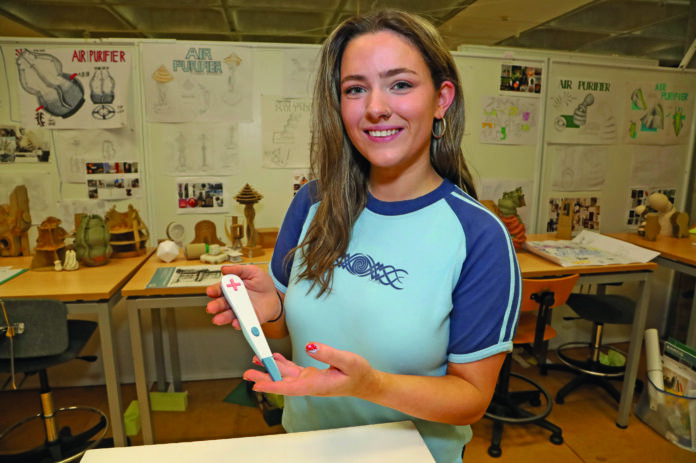
PREGNANCY tests for blind women, clothing that helps reduce stress for homeless people and a device that reduces risk and discomfort for intubated patients are among the incredible projects which feature in the Design@UL 2025 exhibition.
The exhibition will showcase works from over 80 final-year and master’s students of Product Design and Technology which runs until June 6 at Istabraq Hall, Limerick City and County Council, Merchants Quay, Limerick, V94 EH90
This exhibition gives members of the public a chance to see the pioneering work of Ireland’s most talented emerging designers across a range of fields from technology to healthcare to the built environment.
Leah Shanahan, Final year student of Product Design and Technology, has produced AMY. Blind women are the only group excluded from the intimate moment of discovering their own pregnancy.
Leah’s project is a reusable saliva pregnancy test with a difference – designed with the needs of visually impaired women in mind. With AMY, Leah seeks to give these women the autonomy they are currently missing in the very first important step in their pregnancy journey.
Access to AMY would eliminate the need for a blind woman to rely on a sighted person to read a pregnancy test and have them share in this very personal and private moment before they are ready.
Leah has always been interested in designing for women’s health, but she is also blind in her left eye, so designing for accessibility is a personal priority for her.
Stephen Skerritt, Final year student of Product Design and Technology has come up with NOMARIS, a wearable support system designed to empower people experiencing homelessness through emotional regulation and physical comfort.
Stephen was deeply affected by the homelessness crisis in London, where he worked last summer. Working in an exclusive boutique store, dealing with wealthy customers and designer products, he observed a massive disparity in the wealth he encountered at work and the horrific conditions of the homeless individuals he walked past on his trip home every evening.
With layered functionality, the compressive vest combines thermal insulation with deep pressure stimulation (DPS), delivered through a four-layer system that eases muscle tension, regulates body temperature, and calms neural pathways.
Inflatable air channels activate the parasympathetic nervous system, helping to reduce anxiety, improve sleep, and restore mental clarity—mitigating the fight-or-flight responses often numbed through substance or alcohol use. Rather than offering a temporary fix, it creates the conditions for users to remain engaged with support systems.
Aoileann Carmody, Final year student of Product Design and Technology is showcasing Airsure, which she describes as ‘an ET tube securement device that provides reliable stability with minimal facial contact’. Its patient-centred design provides minimal facial contact, ease of use and better hygiene.
A key advantage is that it eliminates the use of tape, which is commonly used with intubation devices employed in hospital settings. This reduces skin damage and makes for a more comfortable device for the patient but it also the design is also a less invasive covering of the face which is invaluable for families of patients in long-term intubation situations or end-of-life care. Aoileann also had a personal interest in the process of intubation through personal experience, as this was a procedure her own mother experienced during cancer treatment.


